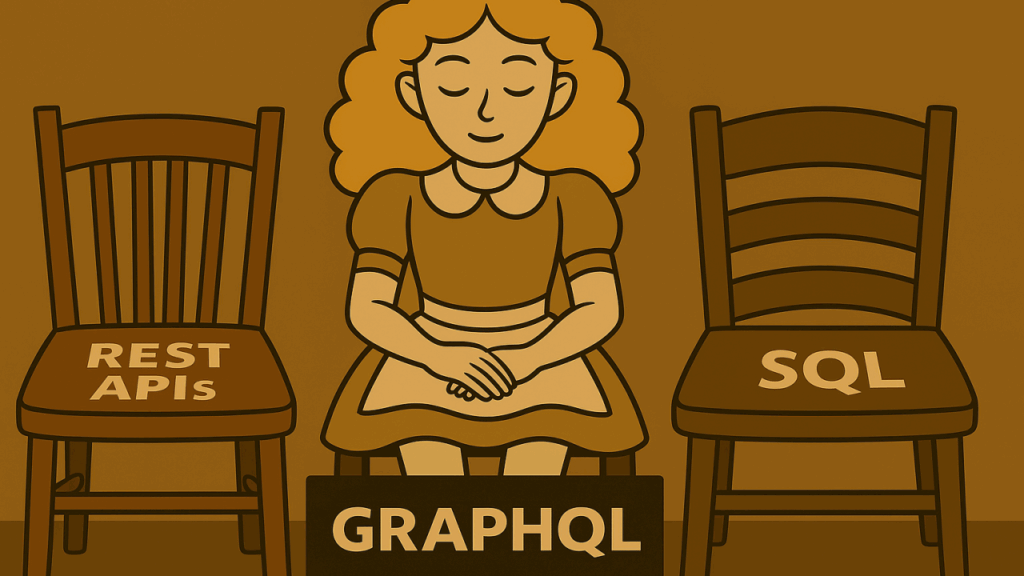This article was also published on LinkedIn
GraphQL is finding new life as a middle ground between the restrictions of fixed REST APIs and the safety and exposure concerns of unlimited SQL queries.
AI clients connecting to enterprise systems via the Model Context Protocol (MCP) exist on a spectrum: one that balances expressive power against operational safety:
- On the “maximum safety” end, AI can interact through a fixed set of REST APIs. This architecture offers predictability and control (those APIs and their arguments/results are all there is)—but it comes at a cost. With tightly scoped endpoints, AI clients can’t go beyond predefined tasks or answer data-rich queries that fall outside what’s been previously exposed to them by a human.
- On the “maximum power” end, there’s unbounded SQL access. Here, AI clients can issue any query a skilled human could construct—unlocking enormous analytical potential through an infinite set of SQL queries or commands. But that power is also risky: queries may be inefficient, expensive, or even destabilizing to backend systems, and they could potentially risk exposing information the end user wasn’t intended to see.
Enter GraphQL, the elegant midpoint.
GraphQL isn’t full SQL—it doesn’t perform joins that aren’t preprogrammed into its schema—but it enables per-query customization of selections, projections, sorting, and more. For AI-based clients that continuously adapt their requests to user intent, this flexibility is invaluable, while the “guard rails” haven’t disappeared entirely.
Why GraphQL Fits MCP + AI So Well
Here are three key advantages GraphQL brings to AI clients in an MCP-driven architecture:
- Flexibility Like SQL, GraphQL lets each query reshape filters and data results on the fly. AI clients can tailor each request dynamically—allowing more precise results with less manual coding and intervention. It can also make backend systems and network bandwidth use more efficient by pushing selections and projections to the server side versus simply discarding unnecessary information.
- Schema Evolution Without Disruption REST APIs typically require redeployment to add fields or restructure parameters. GraphQL allows non-breaking schema evolution, so backend changes can propagate without causing friction—ideal for autonomous AI clients that don’t rely on constant human supervision.
- Built-in Introspection AI agents need to “learn on the fly.” There’s no luxury of retraining each time a new backend API appears. GraphQL’s introspection—letting clients query its schema directly—is a natural fit for MCP workflows and AI understanding. The schema becomes both contract and context.
Even though GraphQL predates MCP by many years, its protocol aligns remarkably well with modern AI needs. Schema introspection is especially powerful when paired with LLM-based clients, allowing them to parse structure and semantics without external handholding—both in the initial connection, and then over time as systems evolve.
But What About Developer Complexity?
Historically, GraphQL’s flexible models (especially nested types) raised risks of backend inefficiency—like the classic “N+1 query” pitfall, where adding details to a response turns into an expensive “FOR loop” of additional database lookups. But AI has a role to play here too: assisting developers during implementation, tuning resolvers, and even generating optimal schemas. This makes today’s GraphQL development much more manageable, mitigating past concerns around performance and effort. With both development and testing burdens lightened, offering GraphQL APIs to any client, including AI-based ones, is less onerous than ever before.
Where It Lands on the Spectrum
So is GraphQL the permanent “just-right” API for AI clients under MCP? Or will enterprises ultimately converge on safer static endpoints or lean into full SQL expressivity?
Time will tell. But for now, GraphQL offers a powerful middle ground—especially for organizations seeking adaptable AI systems without surrendering control or performance.
If your company is looking for assistance with MCP-related data modeling, we can help. Check out vendia.com for more.

